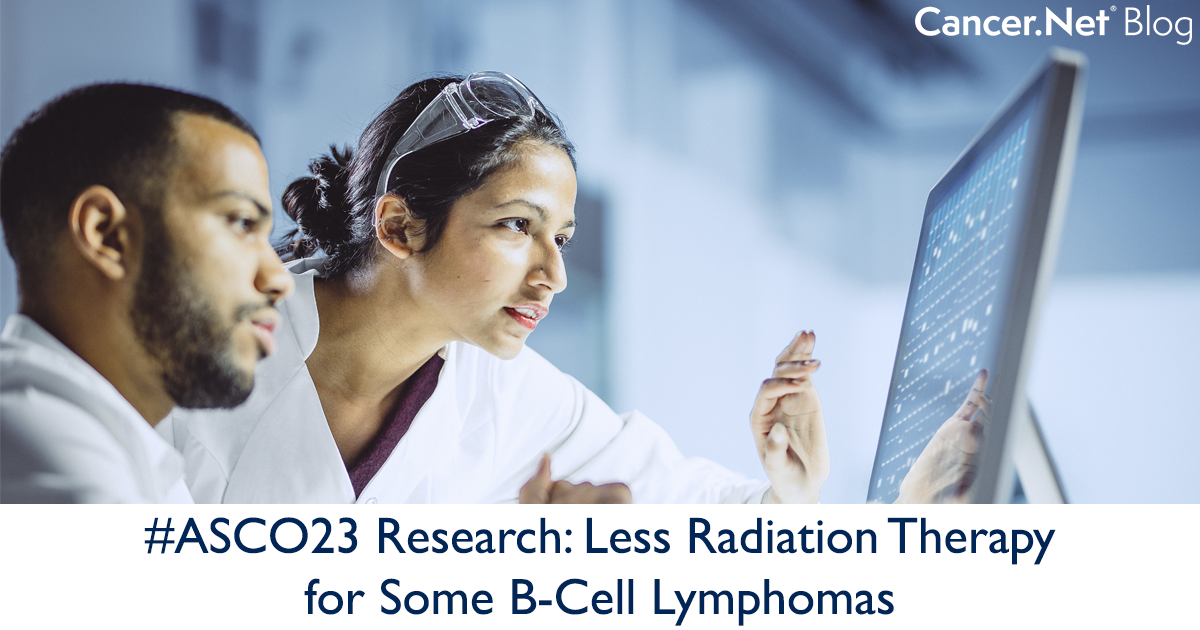
The theme of the 2023 American Society of Clinical Oncology (ASCO) Annual Meeting is Partnering With Patients: The Cornerstone of Cancer Care and Research. From June 2 to 6 in Chicago, Illinois, and online, cancer researchers and clinicians from around the world will gather to discuss the latest research and how to ensure that all people receive the cancer care they need.
ON THIS PAGE
Research that will be presented today includes:
Radiation therapy may not be necessary for primary mediastinal B-cell lymphoma
Who does this study affect: People with primary mediastinal B-cell lymphoma (PMBCL) who have received treatment with chemoimmunotherapy, which is a combination of chemotherapy and the monoclonal antibody rituximab (Rituxan).
What did this study find: Results from the global IELSG37 clinical trial found that chemoimmunotherapy alone is an effective treatment for PMBCL, and not giving radiation therapy as part of treatment does not impact a patient’s chances of cure.
PMBCL is an aggressive form of diffuse large B-cell lymphoma and is most common in women between 30 and 40 years old. It appears as a large mass in the central chest. The mass may cause breathing problems or superior vena cava (SVC) syndrome, a collection of symptoms caused by the partial blockage or compression of the superior vena cava. The superior vena cava is the major vein that carries blood to the heart from the head, neck, upper chest, and arms. About 2.5% of people with non-Hodgkin lymphoma have this subtype.
Treatment for PMBCL has traditionally included radiation therapy after chemoimmunotherapy to lower the risk of the cancer coming back, called a relapse or recurrence. In this study, the researchers wanted to know whether the radiation therapy was an effective part of the treatment plan. Radiation therapy to the chest comes with known risks. It may lead to heart and lung problems and increase the risk of developing second cancers, such as breast, thyroid, and lung cancers.
The study participants were 336 women and 209 men, and they ranged in age from 18 to 70 years. The median age of the patients was 35, meaning that half were older than 35 and the other half were younger than 35. All participants received the standard chemoimmunotherapy. Just over half of the patients (50.6%) had a complete response to the chemoimmunotherapy. These 268 patients with a complete response were then randomly assigned to 2 different treatment groups.
One group (136 patients) received the additional radiation therapy, and the other treatment group (132 patients) was closely observed. The researchers found that patients in complete remission had a 99% overall survival rate at 30 months, regardless of whether they received radiation therapy or not. Adding radiation therapy to lower the risk of recurrence had a small benefit. At 30 months, the cancer had stopped growing or spreading for 98.5% of those who received radiation therapy and 96.2% of those who did not.
Other recent studies have shown that aggressive chemoimmunotherapy regimens alone can be very effective at treating PMBCL without the use of radiation therapy. In addition, checkpoint inhibitors and CAR-T cell therapy are showing promise as treatments for lymphoma that comes back after treatment.
What does this mean for patients? When PMBCL has a complete response to chemoimmunotherapy, patients have a very low risk of the cancer coming back and can likely avoid radiation therapy and its related side effects.
“The need to maximize cure rates with initial therapy has made consolidation radiotherapy a historical standard of care, based on the poor results obtained with chemotherapy alone before rituximab and the excellent results shown in trials in which almost all patients underwent irradiation. This study shows chemoimmunotherapy alone is an effective treatment for primary mediastinal B-cell lymphoma and strongly supports omitting radiotherapy without impacting chances of cure.”
̶ lead study author Emanuele Zucca, MD
Oncology Institute of Southern Switzerland
Bellinzona, Switzerland
Stay Informed
Visit the Cancer.Net Blog each day of the meeting for more scientific highlights from the 2023 ASCO Annual Meeting and how the new research will affect patient care. You can also keep up with the meeting’s news by following Cancer.Net on Facebook and Twitter, where you can follow the #ASCO23 hashtag.
Like what you’ve read here at Cancer.Net? Sign up for our monthly Inside Cancer.Net e-newsletter.







